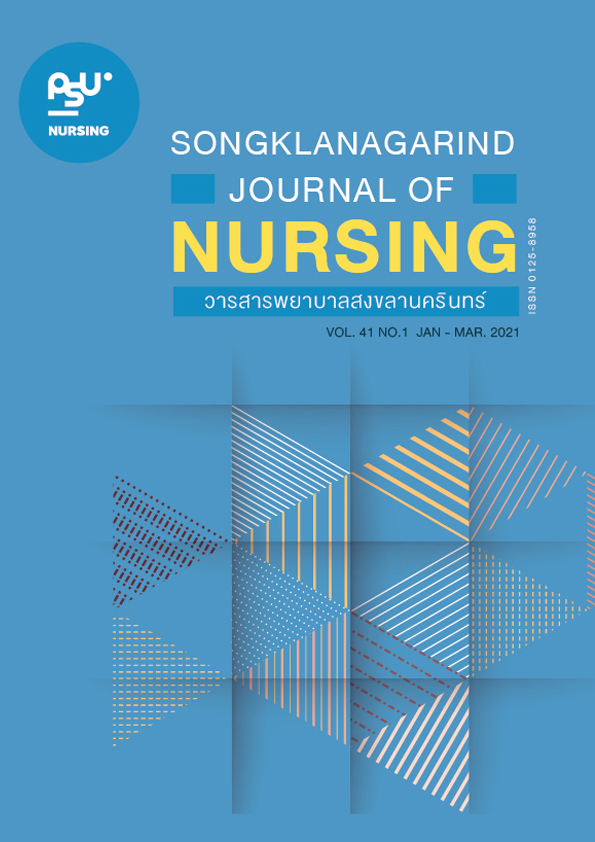Effects of Logotherapy Group Counseling Program on Self-control of Young Delinquents with Substance Abuse
Main Article Content
Abstract
This research aimed to compare self-control levels of young delinquents with substance abuse after receiving Logotherapy Counseling Group. The subjects were 18 to 25 years old delinquents with substance abuse at Southern Region Children and Juvenile Training Centers. Forty-eight youth were in controlled group and forty-eight youth were in experimental group by selective purposive sampling. Most of them are specific cases in which the youth who has been prosecuted for substance abuse at the Youth Training Center of Songkhla and Satun Provinces. The instruments that were used were Logotherapy Counseling Group Program developed by the researcher based on. Frankl’s concepts and Self-Control Assessment Form translated and compiled by Insewok. Reliability with Cronbach’s alpha coefficient was 0.85. T-test and ANOVA with repeated measure was used to analyze the data for the differences in the means of the control and experimental groups’ self-control levels before and after the experiment. The results showed that the experimental group had significantly higher self-control levels than before the experiment and the control group. The experimental group’s self-control levels before and after the experiment and greater than in the follow-up, period were significantly different (p < .01). In particular, the self-control levels before the experiment were significantly different from those measured after the experiment and in the followup period. Logotherapy Counseling Group appeared to be a promising method for enhancing self-control wellness juvenile delinquents with drug use. The youth that have participated in the Logotherapy counseling group resulted in higher levels of self-control than before the test.
Article Details
References
Roche KM, Ahmed S, Blum RW. Enduring consequences of parenting for risk behaviors from adolescence into early adulthood. Soc Sci Med. 2008; 66(9): 2023-34. doi: 10.1016/j.socscimed.2008.01.009.
Will A, Walker C, Mendoza D, et al. Behavior and emotional self-control: Relation to substance use in samples of middle and high school students. Psychol Addict Behav. 2006; 20(3): 256-78. doi: 10.1037/0893-164X.20.3.265.
Frank l. Man search for meaning. New York: Washington Square Press; 1969.
Steger MF, Frazier P, Oishi S, et al. Meaning in life questionniare (MLQ). Journal of Counseling Psychology. 2006; 53: 80-93.
Tuicomepee A. Effects of logotherapy group on increasing purpose in life of women with high risk behavior for HIV positive in Kredtrakarn Home. [master’s thesis]. [Bangkok]: Chulalongkorn university; 1993. 162 p.
Crumbaugh JC, Maholick LT. Manual of instructions for the purpose in life test. abilene, TX: Viktor Frankl Institute of Logotherapy; 1969.
Newcomb MD, Bentler PM. Substance use and abuse among children and teenagers. Am Psychol. 1989; 44(2): 242-8. doi: 10.1037//0003-066x.44.2.242.
Phusakaew R. Effect of group reality therapy on self-control of the high school students. [master’s thesis]. [Bangkok]: Chulalongkorn university; 2001.
Adalbjarnardottir S, Rafnsson FD. Adolescent antisocial behavior and substance use: Longitudinal analyses. Addict Behav. 2002; 27(2): 227-40. doi: 10.1016/s0306-4603(00)00179-9.
Piquero A, Tibbetts S. Specifying the direct and indirect effects of low self-control and situational factors in offenders’ decision making. Toward a more complete model of rational offending. justice quarterly. 1996; 13(3): 481-508. doi: https://doi.org/10.1080/07418829600093061.
Rachlin H. Self-control: Beyond commitment. J Behavioral and Brain Sciences. 1995; 18(01): 109-21.
Corey G. Theory and Practice of Group Counseling. 4 th ed. California : Brooks Cole Publishing Company; 1995.
May R, Yalom I. Existential Psychotherapy. In: Corsini RJ, editor. Current Psychotherapies. 6 th ed; IL: F. E. Peacock; 2000.
Suwanphahu B. Tuicomepee A. Kaemkate W. The effects of logotherapy on change in wellness of substance abuse young delinquents with different levels of self-control. [master’s thesis]. [Bangkok]: Chulalongkorn university; 2014. 295 p.
Insewok Ch. Effect of group reality therapy on increasing degree of self-control and decreasing the drug addiction recidivism of the patients during detoxification period. [master’s thesis]. [Bangkok]: Chulalongkorn university; 1996. 200 p.
Sotthiyapai S. Effects of group self-control skills training on self-control behaviors in juvenile delinquents with amphetamine use. [master’s thesis]. [Bangkok]: Mahidol University; 2002. 114 p.
Songphanich, B. The effects of logotherapy on refugees. [master’s thesis]. [Bangkok]: Chulalongkorn university; 2001. 170 p.
Chongrakchit N. The effects of Rosenbaum’s group activities on increasing the degree of self-control in drug addicts at the rehabilitation center for drug addicts, Department of Health, Bangkok Metropolis Administration [master’s thesis]. [Bangkok]: Ramkhamhaeng University; 2012.
Balthip Q, Petchratchatachat A, Piriyakuntorn S, et al. Utilization of life goals and philosophy of sufficiency economy for holistic health promotion of Thai adolescents. Songklanagarind J Nurs. 2014; 36(3): 111-30. Thai.
DeWitz SJ. Exploring the relationship between self-efficacy beliefs and purpose in life. [master’s thesis]. Ohio state university; 2004. 74 p.
Dyson J, Cobb M, Forman D. The meaning of spirituality: A literature review. J Adv Nurs. 1997; 26(6): 1183-8.
Letzring TD, Block J, Funder DC. Egocontrol and ego-resiliency: Generalization of self-report scales based on personality descriptions from self, acquaintances, and clinicians. J Res Pers. 2005; 39(4): 395-422. doi: 10.1016/j.jrp.2004.06.003.


